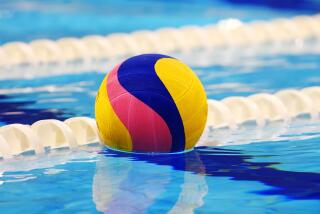Despite Setbacks, They Dive Into Life
- Share via
Pasadena Westridge’s school colors are green and white, but those hues don’t mean much to senior swimmer Eliza Cooper.
“I used to sort of remember colors, but I really don’t anymore,” she said.
Huntington Beach Marina senior swimmer Drew Hunthausen once readily deciphered balls and strikes as a talented Little League player. Now, he couldn’t recognize either if the pitch whizzed by him.
Cooper and Hunthausen are the lone blind students at their schools, and both responded eagerly when others floated the idea of swimming as a plausible athletic endeavor.
“I wish I could still play baseball and golf too,” Hunthausen said. “That’s something else that I miss. But this is kind of like a trade-off.”
Hunthausen, 17, was a healthy 11-year-old when he contracted bacterial meningitis as a sixth-grader in 1998.
In a coma for nearly five months, he came out of it blind, deaf in his left ear and with only partial hearing in his right. He also was troubled by balance and muscle problems.
“It was a life-changing event, for all of us,” said Hunthausen’s mother, Jan. “His cognitive skills are fine, which is the miracle of it all. Now it’s a matter of overcoming all the physical problems.”
Cooper, 18, has been blind since the age of 3 1/2 as a result of glaucoma and cataracts after a variety of congenital eye problems.
A varsity backstroke and sprint-freestyle specialist, she placed 13th in the 100-yard back in the Prep League preliminaries Saturday.
“Swimming just sort of became a challenge,” she said. “I thought it would be fun to prove that I could do it, and I did prove that to myself.”
She dived off the starting block in competition for the first time during league prelims after starting races in the water during the last two seasons.
“It wasn’t the best dive. We hadn’t done it much, so I was just hoping that I didn’t belly-flop, and I didn’t,” said Cooper, who also executed flip-turns for the first time in the meet.
Cooper is guided around the pool deck and campus with the help of a teammate or fellow student.
“I do it all the time,” said Noelle Kenny, a sophomore breaststroker. “You really form a bond because you’re always right next to each other.”
Cooper uses a hand-held computerized Braille note-taker and has maintained a B average. She also sings in two campus choirs and is a member of the Los Angeles Children’s Choir.
She will attend Connecticut College, a private liberal-arts school in New London, Conn.
Like Cooper, Hunthausen, 17, is a good student, with a 3.5 grade-point average.
But his hearing loss and lingering physical problems, as well as Marina’s large campus, with ongoing construction and an enrollment of more than 2,600 students, make many aspects of school life more difficult.
Hunthausen is guided by one of several school-funded aides and another aide helps him take notes in his classes.
Classwork is converted to Braille on a voice-activated home computer each night, and his assignments are translated to the standard written word by a specialized printer. The process can be laborious and often keeps Hunthausen up late.
“It’s not the easiest thing. Some classes, I have to work pretty hard and it’s frustrating,” he said. “To keep a good attitude is the only way I can keep going.”
Swimming helps.
“I wanted to be involved with something to keep me busy and just to be around my peers,” Hunthausen said. “At meets, it’s great because I can sit with the team and be in the relays.”
He can’t swim as fast as other members of the junior-varsity team but is content to go against the clock and happy that his time in the 50-yard freestyle has improved over the year.
Hunthausen turned to swimming largely for social interaction, but his array of problems makes it hard for him to start and maintain friendships.
“Kids could walk by him every day, and they might be saying hi to him, and he might not even know it,” said Drew’s father, Tony.
Hunthausen, who also snow skis with the help of a guide, appears to have the unconditional admiration and support of teammates and opponents, who readily cheer him on as he swims.
But one-to-one personal interactions prove difficult, if they go on at all. At practices, Hunthausen spends nearly all his time only in the company of his aide.
“It’s not that we avoid him,” said Ashley Fisher, a junior sprinter on the team. “I have gone up to him after races, and said, ‘Hey, Drew, good job.’ But then I’m not really sure what to say.”
Hunthausen is open about his difficulties.
“I don’t have specific memories of before I was sick,” he said, “but I definitely know I’ve come a long way from when I first came out of the coma.”


